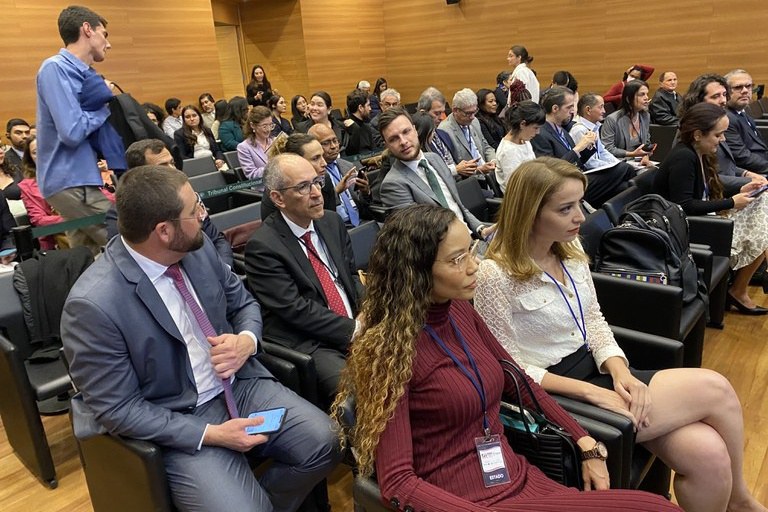Notícias
INTERNATIONAL
Brazil’s paradigm shift: apologies to formerly enslaved communities for violations that occurred in Alcântara in the 1980s

Credit: Ascom/MDHC/Isabel Carvalho
Brazil’s paradigm shift on the international stage concerning violations committed against quilombola communities in the 1980s is the result of intense negotiations by the ministries of Human Rights and Citizenship (Ministério dos Direitos Humanos e da Cidadania/MDHC) and of Racial Equality (Ministério da Igualdade Racial/MIR) to attribute responsibilities in such cases. The first part of the Inter-American Court of Human Rights’ public hearing to analyze the case of Quilombola Communities of Alcântara vs. Brazil was held today (26) in Chile.
[Quilombola communities, or quilombos, are settlements in Brazil that were established in the past by descendants of runaway slaves.]
Among the Brazilian government representatives following analysis of this case is MDHC executive secretary Rita Oliveira. The hearing will give victims – who were removed from their lands when an Armed Forces rocket launch site was built there in the 1980s – the opportunity to speak out. This is the first time that the Brazilian State is tried in a case involving the rights of quilombola communities.
On Thursday (27), Brazilian government representatives will publicly apologize to the quilombola peoples affected by the Alcântara Space Center (Centro de Lançamento de Alcântara/CLA) in the metropolitan region of São Luís, state capital of Maranhão, Brazil. According to Rita Oliveira, the officials intend to highlight the Brazilian State’s responsive attitude.
“We are focused on respect for the communities and their demands; on the need to exchange ideas about the region’s need for technological progress; and on dialogues towards sustainable alternatives. Our stance is to interact with the remaining quilombola communities, their rights, guarantees and respect for traditionality, whilst highlighting their importance to Brazil’s social and economic development,” said Rita Oliveira before the hearing.
Also this Wednesday, Brazil’s Official Gazette (Diário Oficial da União) published a decree establishing an inter-ministerial working group to find alternatives for the territorial titling of remaining quilombola communities in the region. There will be a MDHC representative in the group.
Itamaraty’s Secretary for Multilateral Political Affairs, Carlos Márcio Bicalho Cozendey, drew attention to the fact that Brazil has accepted Inter-American Court of Human Rights jurisdiction since 1998. “It is Brazil’s international commitment to accept whatever the Court decides. These hearings are crucial to judges’ understanding of the victims’ situations. Obviously this is a complex, difficult situation, in which the Brazilian State has effectively failed in many aspects, so all this will be up for discussion – but it must all be framed within the rules of existing human rights pacts in the region,” he observed.
DEPOSITIONS - Declarant Maria Luzia da Silva Diniz is one of the victims of the 1980s mandatory resettlement that resulted in the formation of an agrovillage. During the hearing, she said that difficulties included loss of territory and lack of access to essential services such as health and education. “They took everything from us. We wanted at least to lead dignified lives, and that just didn’t happen over there," she said.
“Whenever we wanted mangoes, we had to fetch them in another village, and this hurts – because in the past we had everything, we didn’t have to go through any humiliation. This new community didn’t have a single fruit tree, so we had to go and fetch fruit in other communities for our children, and that’s humiliating,” she said. Another victim and a witness were also heard this Wednesday afternoon and evening.
IACHR - The Inter-American Court of Human Rights is part of the Inter-American Commission on Human Rights (IACHR). Court president Ricardo Pérez Manrique opened the hearing and gave the floor to Court secretary Pablo Saavedra Alessandri, who presented the grounds for the case. The public hearing of the case of Quilombola Communities of Alcântara vs. Brazil will continue tomorrow, when Brazil’s representatives will also be heard.
Text: R.O.
Edition: P.V.
For questions and more information:
imprensa@mdh.gov.br
Exclusive press service:
MDHC Press Advisory (Assessoria de Comunicação Social/MDHC)
(+5561) 2027-3538
(+5561) 99558-9277 – WhatsApp exclusively for the press